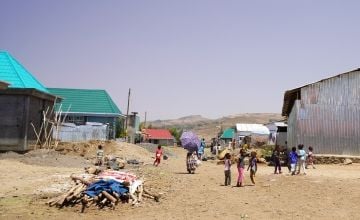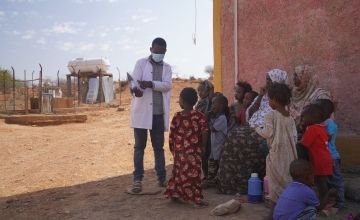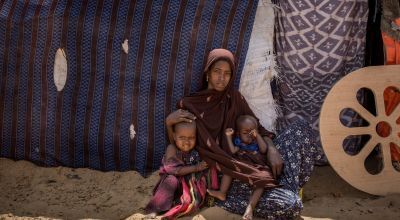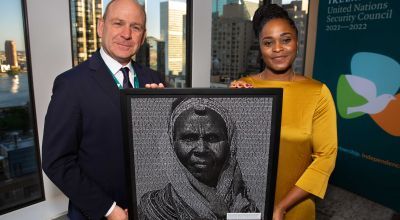
Read our 2023 annual report

Knowledge Hub
You can see how severely malnourished people are after more than two years without almost any rain. You see it in every area you pass through on the 900 kilometre journey from our co-ordination office in the regional capital Jijiga to the Erer zone where Concern is working in the Somali region of Ethiopia.
The land is 100% dry, there is no green to be seen. Wells have dried up, there is almost no surface water. You see the corpses of livestock. People are moving, leaving their animals behind.
When there is no rain, there is nothing to eat. Over 2.2 million people in the Somali region (of a population of 6.5 million) require emergency water interventions over the next five months, to minimise the severity of the drought.
Concern started trucking water into areas where we were already supporting women and young children with nutritional needs, to ensure they stayed on our programmes after we found that many were moving away from where they could be treated, just to find water for themselves and their livestock.
But our funded response is emergency, and is usually for just six months, with funds for water trucking soon coming to an end. Communities ask us, “what do you have planned, we are going back to having no water, will you still be able to do cash transfers, to allow us to buy food?”
I understand their fear – there isn’t any other coping mechanism on the ground.

3.5 million pastoralists and agro-pastoralist are affected in the Somali region by the drought. There’s not enough water to grow the crops needed and livestock are dying in large numbers. To lose all their livestock is a loss of identity and standing within the community, it’s very hard to come back from that.
We can see the desperate faces we meet wherever we go, the malnourished children, pregnant and breast-feeding mothers.
So far in 2022, there have been a total of 72,727 cases of young children suffering from Severe Acute Malnutrition admitted in the Somali region, an increase of 36.3% compared with the same period last year. We’re supporting 180,000 people with nutrition activities, and the number of people needing support is growing week by week.
The numbers however don’t tell the full story. A child attending a treatment centre for severe or acute malnutrition is provided with Ready to Use Therapeutic Food to bring home, to help them put on weight and improve their condition. But what is happening is that there are more children at home, just as hungry and that food is shared among the whole family, to stop them starving. That child, instead of coming back in three weeks, returns after a week, and we don’t always have the supplies available to give them, to help them get better.
We can see the desperate faces we meet wherever we go, the malnourished children, pregnant and breast-feeding mothers
Adding to the drought and malnutrition, we also have confirmed cases of measles in two areas, which also increases the risk of death, especially for children who are malnourished as their immune systems are weakened. People will tell you they are now not just worried about malnutrition.
Like the rest of the world, inflation is also proving a huge challenge. Here in Somali region the exchange rate is linked, not to the official rate of the Commercial Bank of Ethiopia, but to that set on the border with neighbouring Somaliland where it sets the price of imports. That exchange rate is twice as high.
Prices are not stable. If you go the market to get some groceries you will not know the exact price because the exchange rate is confirmed day-to-day.
Imagine what it is like for people who are experiencing this drought, who don’t have any other means to support their life – they don’t know each day what the little money they have will get them, whether it’s through receiving cash transfers from organisations like ourselves, and if not, turning to begging in large cities, because they have lost everything.
I am from the Somali region. I was born in Jijiga and grew up here. It’s very hard to see communities suffering. It’s frustrating, not just here but across the Horn of Africa. The Somali regional government are doing their best – as are the Somali diaspora - but there is a limited and scarce budget, and more international funding to organisations working on the ground is badly needed.

We need long-term funding to allow us to reassure communities that they have a safety net. Otherwise you are working like a firefighter, putting water on the fire to put it out, but everything is destroyed and then another crisis hits.
Projects like rehabilitating water sources and fixing communal toilets are beginning now to get funding which will have a long term impact, but there needs to be support for communities where that’s not happening.
If famine is declared in regions of Somalia, we will see communities from there cross the border, over to this region, as many have roots here. It will put added strain on already limited resources.
Communities who can, are already supporting internally displaced people, with what little they have, but if the drought looks to continue as predicted, even this support will disappear.
Su’ad Abdifetah works for Concern Worldwide in Somali region in eastern Ethiopia. Their name has been changed for security reasons.





